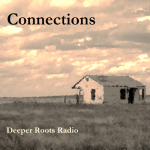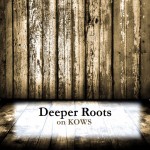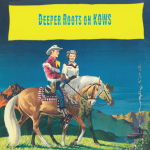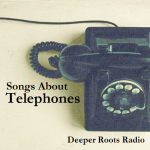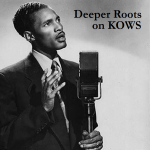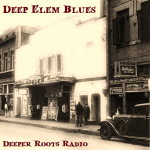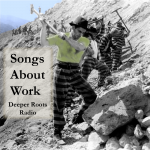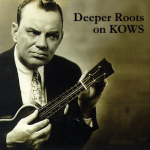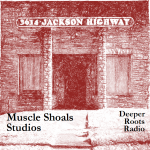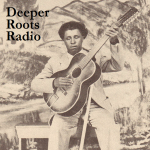| 1 | Artist |
Title |
Album |
Buy |
| 2 | Asleep at the Wheel/Johnny Gimble |
Big Balls in Cowtown |
The Very Best of Asleep at the Wheel Since 1970 |
 |
| 3 | Bob Wills & His Texas Playboys |
I Had Someone Else Before I Had You |
Tiffany Transcriptions, Vol. 5 |
 |
| 4 | The Light Crust Doughboys |
Blue Guitars |
Western Swing: Hot Hillbilly Jazz & Blues – 1935-1947 |
 |
| 5 | Skeets McDonald |
Fuss and Fight |
Skeets McDonald – Heart Breakin' Mama (Gonna Shake This Shack Tonight) |
 |
| 6 | W. Lee & His Hillbilly Boys |
Congratulate Me |
Western Swing Chronicles Vol. 4 1933-1938 |
 |
| 7 | Willie Nelson |
Cherokee Maiden |
You Don't Know Me: The Songs of Cindy Walker |
 |
| 8 | Warren Smith |
Got Love If You Want It |
The Sun Country Box CD4 So Long, I'm Gone |
 |
| 9 | Bobby Hicks & Del McCoury |
We're Steppin' Out Tonight |
Bluegrass Number 1's: A Collection of Chart-Topping Songs |
 |
| 10 | Ralph Stanley |
Are You Washed In The Blood |
A Mother's Prayer |
 |
| 11 | Ralph Stanley |
Dad's Old Rocky Field |
Old Songs & Ballads |
 |
| 12 | The Rice Brothers |
Grapes On the Vine |
Bluegrass Number 1's: A Collection of Chart-Topping Songs |
 |
| 13 | The David Thom Band |
The Little White Church |
That Old Familiar |
 |
| 14 | Selah Jubilee Singers |
I Saw the Light |
Gospel Quartets 1921-1942 Vol. 2 |
 |
| 15 | The Selah Singers |
I'll Be Satisfied |
Capitol Records' From The Vaults, Volume 5 – Roots Of Rock 'N' Roll – 1944-53 |
 |
| 16 | The Dixie Hummingbirds |
Christian's Automobile |
20th Century Masters – The Millennium Collection: The Best of the Dixie Hummingbirds |
 |
| 17 | Nina Simone |
I Wish I Knew How It Would Feel To Be Free |
Forever Young, Gifted & Black: Songs Of Freedom And Spirit |
 |
| 18 | Aretha Franklin |
River's Invitation |
Queen Of Soul: The Atlantic Recordings [Disc 2] |
 |
| 19 | Percy Mayfield |
Strange Things Happening |
ABC Of The Blues Vol 28 |
 |
| 20 | Ray Charles |
Hit the Road Jack |
Genius & Soul: The 50th Anniversary Collection Disc 2 |
 |
| 21 | Buddy Miller |
Please Send Me Someone To Love |
Midnight And Lonesome |
 |
| 22 | Freddie King |
Look On Yonder Wall |
Woman Across the River |
 |
| 23 | The Mississppi Mud Mashers |
Bring It On Home To Grandma |
Flashbacks #3 CopulationBlues 1926-1940 |
 |
| 24 | Texas Alexander |
The Risin' Sun |
As Good As It Gets: Country Blues [Disc 2] |
 |
| 25 | Blind Lemon Jefferson |
Easy Rider Blues |
Classic Sides Disc 2 |
 |
| 26 | Ishman Bracey |
Woman Woman Blues (Pm 12970, L-239-2) |
The Rise & Fall of Paramount Records, Volume 2 (1928-1932) |
 |
| 27 | Charlie Spand |
Ain't Gonna Stand For That (Pm 12856, 15454–) |
The Rise & Fall of Paramount Records, Volume 2 (1928-1932) |
 |
| 28 | Jean Brady and Big Bill Broonzy |
Knocking Myself Out |
Flashbacks #1 Drug Songs 1917-1944 |
 |
| 29 | Lightnin' Hopkins |
Buddy Brown's Blues (98 Degree Blues) |
The Complete Prestige-Bluesville Recordings [Disc 2] |
 |
| 30 | Frank Crumit |
There's No One With Endurance |
grimriper2u@yahoo.com FRANK CRUMIT |
 |
| 31 | Cliff Edwards |
K-K-K-Katy & When You Wore A Tulip |
CLIFF EDWARDS grimriper2u@yahoo.com |
 |
| 32 | Herbert Payne |
Smoke Clouds |
Flashbacks #1 Drug Songs 1917-1944 |
 |
| 33 | Al Jolson |
Toot, Toot Tootsie (Goo'bye) |
50 #1 Hits Of The '20s & '30s |
 |
| 34 | Billy Joe Shaver |
Hill Country Love Song |
Oxford American Southern Music Texas |
 |
| 35 | Marty Robbins |
The Strawberry Roan |
Gunfighter Ballads and Trail Songs |
 |
